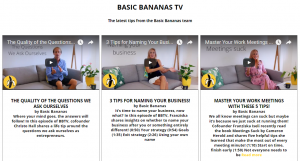An Introduction to Content Marketing
Does anyone else hate sales as much as I do?
I’ve done a stint working as a personal trainer in the past. While I love fitness and working with clients, I really, really hated the selling part. The thought of having to approach a prospect and ask if they want to do business was enough to fill me with dread.
“So… um… do you think you might want to… um… train with me?” I’d resort to stammering each time.
I had many mentors assure me that it was as easy as “telling them about the benefits of my service” but I’d still baulk each time. I wanted to err on the side of being relaxed and not pushy. But that often meant I didn’t ask for a sale at all. It’s just something about asking someone for their business (or money) that gives me the heebie-jeebies.
I think that this is why I fell in love with content marketing after I started at Bizboost. It allows you to do the initial legwork (describing your product/service, explaining the benefits) before you even meet with the prospect. Sure, you still have to have that chat about prices eventually (gulp), but by that point, half the pitch has already been completed.
So What Is Content Marketing?
Content marketing involves creating online material that is designed to provide information for your audience and generate interest in the products or services that you sell. Examples include written articles or blog posts, videos, podcasts and social media posts.
The ultimate goal is to:
- Get your business name out there. Show new prospects that you exist.
- Generate interest in your business and the products/services that you provide.
- Build familiarity and trust in your brand. It gives you an opportunity to show that you are an expert in your field.
It also has a lot of other benefits, such as helping your business rank higher in search engines like Google.
There are a couple of great examples of companies that do it well:
Blogging: Tindall Gask Bentley
Tindall Gask Bentley is a law firm that has its content marketing down to a fine art. On their website, they have a blog that discusses a variety of different legal issues and questions that people might have. (Examples include: ‘work has caused me a psychological illness. Can I claim?’ ‘Can I get sacked for talking about my employer on social media?’ ‘Can posting about my children on social media impact my custody arrangement?’).
It’s a perfect example of a business providing useful information to their audience while showing them that they are a team of people who really know what they’re talking about.
Video: Basic Bananas
Basic Bananas is a marketing company based in Queensland. So it probably comes as no surprise that they do content marketing well!
One of the many mediums they take advantage of is video. Each week, they create short (generally around 4-7 minute) video discussing tips and tricks on how to make your working life easier. It provides a lot of practical and useful information for their viewers as well as touching on the services that they provide for their clients.
Podcast: Shopify Masters
 Shopify is an e-commerce company that develops computer software for online stores (often used by us on our websites). As well as having a blog and solid social media strategy, they also produce a podcast called Shopify Masters.
Shopify is an e-commerce company that develops computer software for online stores (often used by us on our websites). As well as having a blog and solid social media strategy, they also produce a podcast called Shopify Masters.
(If you haven’t heard of a podcast before, think of it like a catalogue of radio segments that you can pick and choose from at will).
On their podcast, they interview someone (who generally uses Shopify on their website) on how their business became a success. It’s often filled with great tips for business owners and marketers alike. And of course, it also often touches on how they used Shopify to boost their online store.
Social Media: Lorna Jane
Lorna Jane is an Australian fashion brand, specialising in active wear and exercise clothes. While they’ve had some controversy lately about their hiring criteria, there is no arguing that Lorna Jane does social media well. Their Facebook, Instagram and Twitter feeds are filled with happy, confident-looking models sporting their latest fashion. This is generally paired with a positive quote on how we should love our bodies, love ourselves and take on the world headfirst. How can a young, health-conscious girl (their target market) resist all that fitness #inspo*?
*inspo: short for inspiration. Often used by teens and twenty-something woman on social media, often following a hashtag.
How to Make It Work for You
For content marketing to be successful, you need to make it work for your business.
Be Strategic About Your Content: focus on helping, not on selling
The good news is that this type of marketing is not solely about encouraging people to buy from you. Writing great content isn’t about trying to manipulate people them into a certain course of action. Instead, it allows you to focus on helping that person solve a problem.
Ask yourself, what is it they might want to know about what we do? What information do they need in order to make the most of your product or service? This might lead an IT company to write a “how-to” guide which explains how to set up a new laptop. Or it might lead to a greengrocer writing about the “10 surprising benefits of eating strawberries”. Or an accountant might write a checklist of what a business should do prior to tax time to make the process easier. It’s different for all businesses, so focus on your target market and what they need.
Get It Out There
It’s not enough to just create the content. You’ve also got to get it out in front of new prospects.
Perhaps you might decide to set up a blog on your website. Social Media pages are also a great way to keep your followers up to date on your latest news. If you already have a database full of contacts, including an article or two in your next newsletter is also a great way to disseminate your content.
So that’s it. It’s our tips for marketing when you hate selling. If you already use content creation as part of your marketing strategy, we’d love to know. Have you found it useful? Let us know in the comments below.














